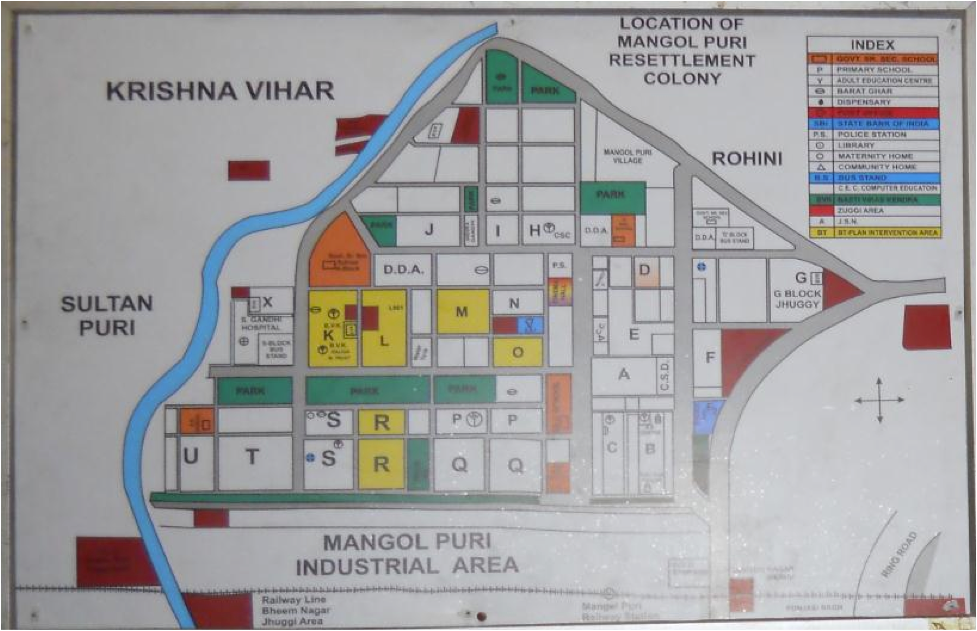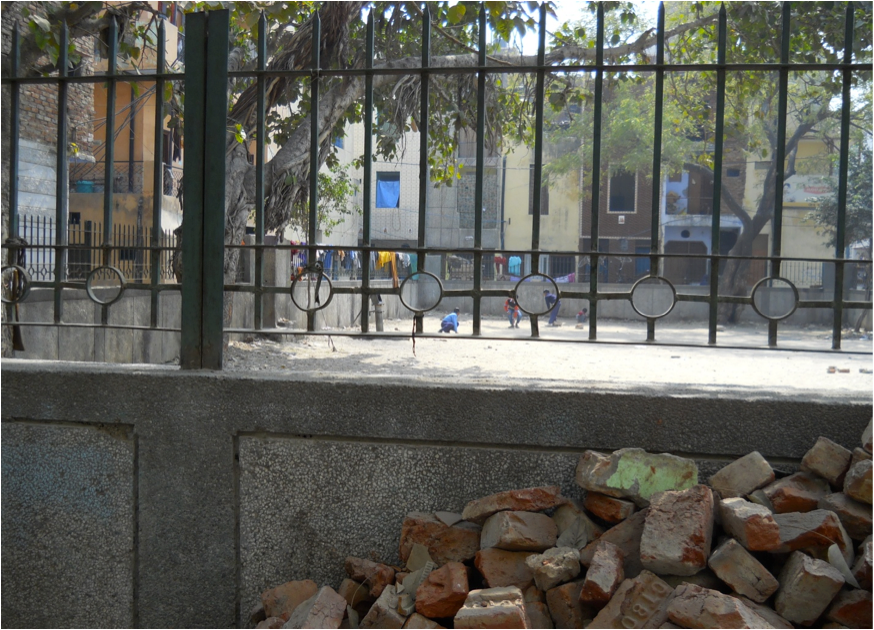Mangolpuri is a Delhi slum with 50,000 families and nearly 250,000 people.

Baliga Trust is a highly respected, richly staffed and funded grassroots organization working in a number of project areas across India. Their emphasis is universal elementary education, the breakdown of barriers of negativity in religion, caste, class and gender, and the preparation and education of microfinance groups, particularly those involving women. They have worked in Mangolpuri since 1973, whereas Plan is a newcomer, arriving in 2008.
In total there are 15 Plan/Baliga Trust field workers in the 5 blocks of Mangolpuri where Plan works. (Baliga Trust is also active in the other 18 blocks of Mangolpuri, where they work with other NGOs.) To complicate things further, Plan works with Baliga in all 23 blocks on the empowerment of women and microfinance.
The map of the Mangolpuri area below shows all blocks. The 5 in which Plan works are shown in yellow. Parks are shown in green, although they are actually rock and gravel.

Plan’s 5 blocks cover about 10,000 families, averaging 5.4 members. Baliga Trust has 8 field officers, 4 project coordinators and 1 Program Manager to implement sponsorship programs in the community. The Delhi Plan Program Unit sponsorship support staff help in monitoring as well as management of sponsorship software.
Each field officer from Baliga Trust supports 600-700 families in Plan’s area in the development process. Programs are conducted with all families in the area. However, each officer does a supplementary follow-up with 100 – 250 families about once a week to assess the programs. This also helps us to take stock of families and children and determine whether any of their issues are yet untouched or unanswered. Plan has 2,159 sponsored children, but works with all children in the family, not just the sponsored ones.
In order to be accepted by Plan/Baliga a family must earn no more than 3,000 to 5,000 rupees ($60 to $100) a month, depending on family size. A community meeting facilitated by Plan is held to determine which families meet this criterion. This process is tremendously effective. People in the community are minutely familiar with each other’s affairs: there is no place to hide away family resources.

A Mangolpuri playground, mainly gravel
The Delhi government pays the slum dwellers a stipend of 2,500 rupees ($50) a month per household.
A Plan staffer in Mumbai told me that Delhi `was the capital of sexual harassment’. Mangolpuri slum is the most unsafe of the areas in which Plan works. It is a city unto itself, sealed in by factories on three sides. There is no outside, no open views or vistas, and no place to be alone.
The men work in the factories for meagre pay with no prospects. The majority of them have turned to substance abuse and gambling, and show up at home erratically. Many of the youths and men in their twenties are involved in organized drug crime. There are no gangs, however.
And yet Mangolpuri is surprisingly clean and cheerful. There is little garbage strewn around, and the paved lanes seem to have been swept. Houses are often concrete, some painted peacock blue or rose pink. The central streets between blocks are about 10’ wide and paved. (The main ‘roads’ we would see on one Mumbai community, however, were three feet wide, bordered by high tin slum dwellings that cut off most of the light.)


Hindu temple in Mangolpuri
Outside many of the doorways a mat saying ‘Welcome’ has been drawn on the concrete in coloured chalk. People are everywhere. There are a number of playgrounds, but they are gravel and rock. No one was playing in them.
It was hard to believe that there was so much violence. But we were told that girls had to take a longer, circuitous route to school to bypass the area where the boys and men had congregated to wait for them. (Sexual harassment goes by the prettified, quaint name of ‘Eve-teasing’.) Beatings and sexual abuse occur in the homes, and corporal punishment is used to discipline children in school. Girls and boys are prey to sexual abuse in roughly equal numbers. It was rumoured at one time that the government school principal was involved with the neighbourhood ‘goons’.
Mothers in the slum are happy with Plan’s activities. Men were initially ‘dead set against’. (Men, however, are involved in drug and substance abuse; the mother is the backbone of the family.) The men’s attitude is changing, but slowly. Plan has only been in the community three years and will probably stay another twelve or so. A big part of their work involves voice-giving and confidence-building with mothers, in addition to their children.
